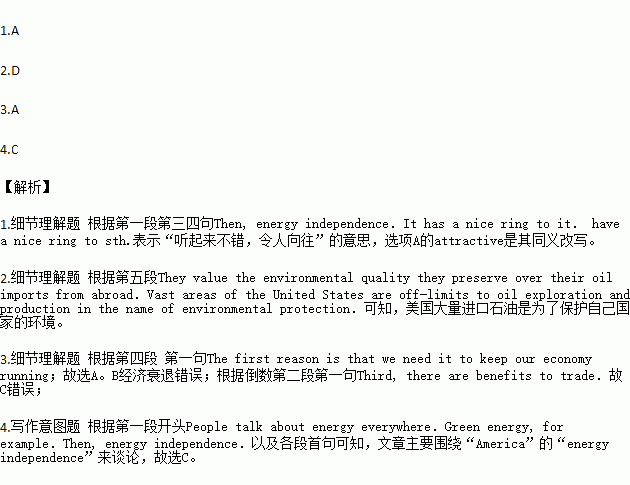题目内容
E
People talk about energy everywhere.Green energy, for example.Then, energy independence.It has a nice ring to it.Doesn' t it? If you think so, you' re not alone, because energy independence has been the dream of American president for decades, and never more so than in the past few years, when the most recent oil price shock has been partly responsible for kicking off the great recession(经济衰退).
"Energy independence" and its rhetorical (修辞的) companion "energy security" are, however, unreliable concepts that are rarely thought through.What is it that we want independence from, exactly?
Most people would probably say that they want to be independent from imported oil.But there are reasons that we buy all that oil from elsewhere.
The first reason is that we need it to keep our economy running.Yes, there is a trickle ( 涓涓细流) )of biofuel ( 生物燃料 )available, and more may become available, but most biofuels cause economic waste and environmental destruction.
Second, Americans have basically decided that they don't really want to produce all their own oil.They value the environmental quality they preserve over their oil imports from abroad.Vast areas of the United States are off-limits to oil exploration and production in the name of environmental protection.To what extent are Americans really willing to tolerate the environmental influence of domestic(国内的) energy production in order to cut back imports?
Third, there are benefits to trade.It allows for eoonomic efficiency, and when we buy things from places that have lower production costs t1i;m we do, we benefit.And although you don't read about this much, the United States is also a large exporter of oil products, selling about 2 million barrels of petroleum products per day to about 90 countries.
There is no question that the United States imports a great deal of energy and, in fact, relies on that steady flow to keep its economy stable.When that flow is interrupted, we feel the pain in short supplies and higher prices.At the same time, we get massive economic benefits when we buy the most affordable energy on the world market and when we engage in energy trade around the world.
1.What does the author say about energy independence for America?
A.It sounds very attractive.
B.It ensures national security.
C.It will bring oil prices down.
D.It will protect the environment.
2.Why does America rely heavily on oil imports?
A.It wants to expand its storage of raw oil.
B.Its own oil reserves are quickly running out.
C.Its own oil production falls short of demand.
D.It wants to keep its own environment untouched.
3.What does the author say about oil trade?
A.It improves economic efficiency.
B.It makes for economic recession.
C.It brings benefit only to the sellers.
D.It saves the cost of oil exploration.
4.What is the author' s purpose in writing the passage?
A.To explain the increase of international oil trade.
B.To raise Americans' awareness of the energy crisis.
C.To argue for America' s dependence on oil imports.
D.To stress the importance of energy protection.
 星级口算天天练系列答案
星级口算天天练系列答案
